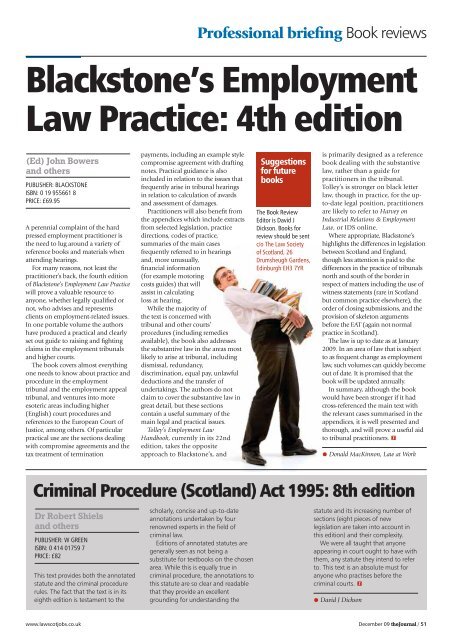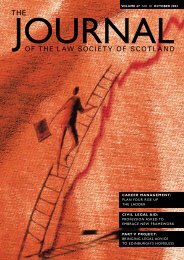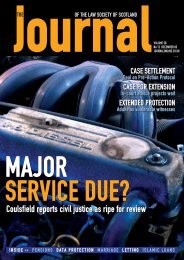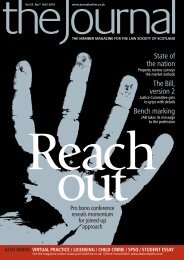Professional briefing - The Journal Online
Professional briefing - The Journal Online
Professional briefing - The Journal Online
Create successful ePaper yourself
Turn your PDF publications into a flip-book with our unique Google optimized e-Paper software.
<strong>Professional</strong> <strong>briefing</strong> Book reviews<br />
Blackstone’s Employment<br />
Law Practice: 4th edition<br />
(Ed) John Bowers<br />
and others<br />
PUBLISHER: BLACKSTONE<br />
ISBN: 0 19 955661 8<br />
PRICE: £69.95<br />
A perennial complaint of the hard<br />
pressed employment practitioner is<br />
the need to lug around a variety of<br />
reference books and materials when<br />
attending hearings.<br />
For many reasons, not least the<br />
practitioner’s back, the fourth edition<br />
of Blackstone’s Employment Law Practice<br />
will prove a valuable resource to<br />
anyone, whether legally qualified or<br />
not, who advises and represents<br />
clients on employment-related issues.<br />
In one portable volume the authors<br />
have produced a practical and clearly<br />
set out guide to raising and fighting<br />
claims in the employment tribunals<br />
and higher courts.<br />
<strong>The</strong> book covers almost everything<br />
one needs to know about practice and<br />
procedure in the employment<br />
tribunal and the employment appeal<br />
tribunal, and ventures into more<br />
esoteric areas including higher<br />
(English) court procedures and<br />
references to the European Court of<br />
Justice, among others. Of particular<br />
practical use are the sections dealing<br />
with compromise agreements and the<br />
tax treatment of termination<br />
This text provides both the annotated<br />
statute and the criminal procedure<br />
rules. <strong>The</strong> fact that the text is in its<br />
eighth edition is testament to the<br />
payments, including an example style<br />
compromise agreement with drafting<br />
notes. Practical guidance is also<br />
included in relation to the issues that<br />
frequently arise in tribunal hearings<br />
in relation to calculation of awards<br />
and assessment of damages.<br />
Practitioners will also benefit from<br />
the appendices which include extracts<br />
from selected legislation, practice<br />
directions, codes of practice,<br />
summaries of the main cases<br />
frequently referred to in hearings<br />
and, more unusually,<br />
financial information<br />
(for example motoring<br />
costs guides) that will<br />
assist in calculating<br />
loss at hearing.<br />
While the majority of<br />
the text is concerned with<br />
tribunal and other courts’<br />
procedures (including remedies<br />
available), the book also addresses<br />
the substantive law in the areas most<br />
likely to arise at tribunal, including<br />
dismissal, redundancy,<br />
discrimination, equal pay, unlawful<br />
deductions and the transfer of<br />
undertakings. <strong>The</strong> authors do not<br />
claim to cover the substantive law in<br />
great detail, but these sections<br />
contain a useful summary of the<br />
main legal and practical issues.<br />
Tolley’s Employment Law<br />
Handbook, currently in its 22nd<br />
edition, takes the opposite<br />
approach to Blackstone’s, and<br />
Criminal Procedure (Scotland) Act 1995: 8th edition<br />
Dr Robert Shiels<br />
and others<br />
PUBLISHER: W GREEN<br />
ISBN: 0 414 01759 7<br />
PRICE: £82<br />
www.lawscotjobs.co.uk<br />
scholarly, concise and up-to-date<br />
annotations undertaken by four<br />
renowned experts in the field of<br />
criminal law.<br />
Editions of annotated statutes are<br />
generally seen as not being a<br />
substitute for textbooks on the chosen<br />
area. While this is equally true in<br />
criminal procedure, the annotations to<br />
this statute are so clear and readable<br />
that they provide an excellent<br />
grounding for understanding the<br />
Suggestions<br />
for future<br />
books<br />
<strong>The</strong> Book Review<br />
Editor is David J<br />
Dickson. Books for<br />
review should be sent<br />
c/o <strong>The</strong> Law Society<br />
of Scotland, 26<br />
Drumsheugh Gardens,<br />
Edinburgh EH3 7YR<br />
is primarily designed as a reference<br />
book dealing with the substantive<br />
law, rather than a guide for<br />
practitioners in the tribunal.<br />
Tolley’s is stronger on black letter<br />
law, though in practice, for the upto-date<br />
legal position, practitioners<br />
are likely to refer to Harvey on<br />
Industrial Relations & Employment<br />
Law, or IDS online.<br />
Where appropriate, Blackstone’s<br />
highlights the differences in legislation<br />
between Scotland and England,<br />
though less attention is paid to the<br />
differences in the practice of tribunals<br />
north and south of the border in<br />
respect of matters including the use of<br />
witness statements (rare in Scotland<br />
but common practice elsewhere), the<br />
order of closing submissions, and the<br />
provision of skeleton arguments<br />
before the EAT (again not normal<br />
practice in Scotland).<br />
<strong>The</strong> law is up to date as at January<br />
2009. In an area of law that is subject<br />
to as frequent change as employment<br />
law, such volumes can quickly become<br />
out of date. It is promised that the<br />
book will be updated annually.<br />
In summary, although the book<br />
would have been stronger if it had<br />
cross-referenced the main text with<br />
the relevant cases summarised in the<br />
appendices, it is well presented and<br />
thorough, and will prove a useful aid<br />
to tribunal practitioners.<br />
Donald MacKinnon, Law at Work<br />
statute and its increasing number of<br />
sections (eight pieces of new<br />
legislation are taken into account in<br />
this edition) and their complexity.<br />
We were all taught that anyone<br />
appearing in court ought to have with<br />
them, any statute they intend to refer<br />
to. This text is an absolute must for<br />
anyone who practises before the<br />
criminal courts.<br />
David J Dickson<br />
December 09 the<strong>Journal</strong> / 51










